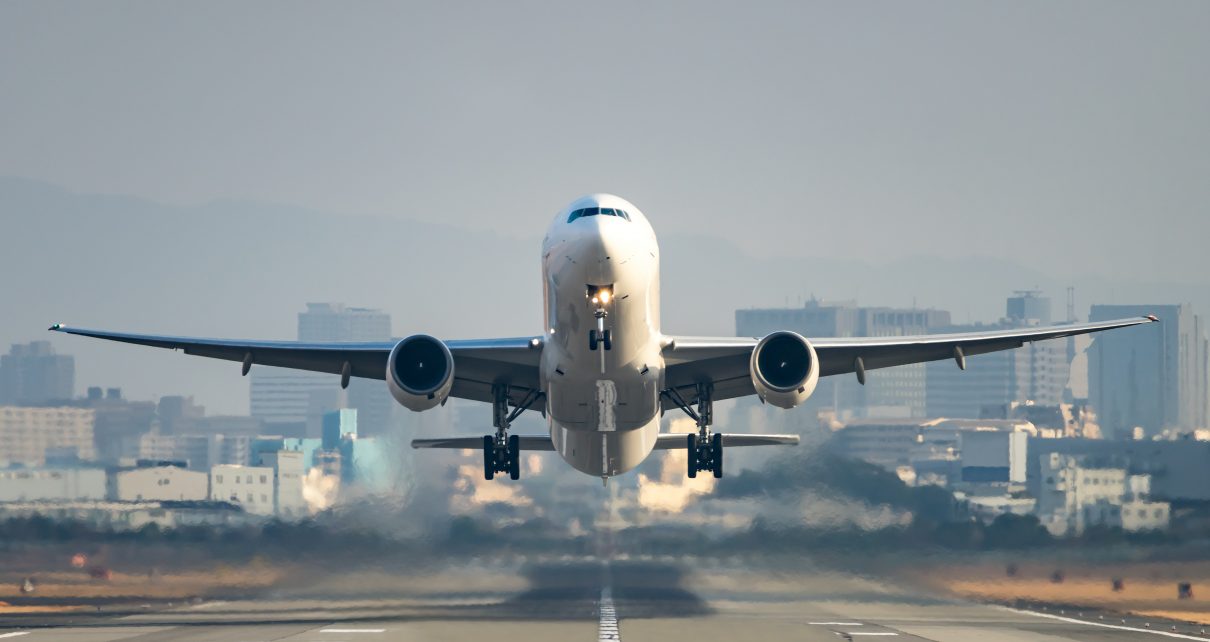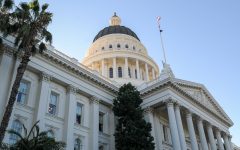
Airplane taking off from the airport. (Photo: motive56, Shutterstock)
Study Finds California’s Meal and Rest Break Law Would Substantially Harm Airline Operations
Besides costing airlines billions annually, the study found routes would be cut, millions of seats would be removed
By Evan Symon, March 15, 2022 4:19 pm
A study by Canadian travel consulting firm InterVistas released on Tuesday found that the higher number and frequency of breaks and meal breaks under California law over federal law will cost the airline industry between $3.5 billion and $8.5 billion due to the need for more flight crews, but flights and other negative affects.
Press play to hear a narrated version of this story, presented by AudioHopper.
Currently, the Federal Aviation Administration (FAA) has maximum 14 hour work days for flight crews with a minimum of 9 hours off. Breaks are also more uniform, with flight crews having to remain on duty during such breaks. While there is currently a proposal to slightly alter the regulations, including an extra hour of break time between shifts, the current regulations remain unchanged.
However, in recent years, California’s Meal Break and Rest Break law severely challenges the FAA. Under California law, airline employees in California, including in the air, would be able to go off duty for ten minutes every four hours, with a 30 minute meal break every five hours, also off the clock. For every missed break, employees would get one hour of pay regardless of time missed. And while employees can work up to 14 hours a day, pay after 8 hours is set at time and a half, with any hours after 12 a day being put down as double.
While initially the FAA laws were set despite the law, the 9th U.S. Circuit Court of Appeals ruled last year in Virgin America v. Bernstein that California-based flight crews would fall under Californian law and not federal FAA law. Trade groups were quickly up in arms, as California’s decision could lead to other states with different break and work regulations to take precedent as well, creating a variety of different laws across the country rather than the singular FAA one. While the matter is now at the Supreme Court, airlines have been looking deeper into what the Californian law might mean.
The InterVistas study became the first look on Friday. Besides costing billions to airlines each year, the study found that many routes would be cut because of the heightened costs, with millions of seats would be removed, and airline revenue would decrease between 3% and 20%. The loss of routes would also mean lost pilot and flight crew jobs, with estimates in the 58,000 and 262,000 being lost range. California based crews would be hardest hit, with either steep reductions in the amount of crews based in California, or a pull out of crews in the state all together. Route cancellations would likely follow to other states, with international travel also being disrupted to a large degree.
The new study has created new debate over California’s separate system and if other states should follow or if the federal government should be allowed an encompassing standard. Airline employees themselves have been mixed, but employee groups and unions have said that they favor the laws in order to give them adequate time off and rest so that no errors can be made while in flight due to lack of rest and other factors caused by an inadequate break system.
“Management claims they couldn’t possibly keep up with state laws, but at every turn from Washington to California to New York and Illinois they’re working overtime to deny aviation workers adequate nutrition, rest, and sick leave,” noted president of the Association of Flight Attendants Sara Nelson.
Airlines and passenger groups, meanwhile, favor federal standards, noting that California’s break system, if upheld, could cause many flights to be pulled, with higher costs for customers and lost revenue for companies.
“It’s ok to want change, but you can’t make the kind of change that would hurt so much,” Randall Benson, a Washington-based airline consultant, told the Globe on Tuesday. “If the Supreme Court upholds California, that would likely lead to other states’ systems coming in too, and I can’t even begin to tell you how bad that would be. Airlines would shift to where they can make money and federal intervention in keeping flights up would likely come. Open Skies might need to be severely remade.”
“The smart thing to do would be to work with the FAA to change things gradually over a few years so airlines can properly adjust. You drop a new set of laws like this on them instantly, and things go downhill fast. You can’t change policy like this immediately and broadly without huge consequences, like billions being lost.”
Virgin America v. Bernstein is currently on the docket at the U.S. Supreme Court.
- Bill to Require Law Enforcement Disclosure if AI Was Used To Help Write Reports - August 7, 2025
- Gov. Newsom Files FOIA Request To ‘Expose True Cost’ Of L.A. Federal Troop Deployment for Anti-ICE Riots - August 6, 2025
- California Redistricting: How Newsom’s Plan Will Demolish Hard Fought GOP Gains - August 6, 2025





Leave it to the buffoonish DemocRATS infesting the legislative and executive branches in Sacramento to kill jobs, make air travel much more expensive, and reduce flights to/from CA. They destroy EVERYTHING they touch. Keep voting for failure and incompetence, CA voters.
Comrades
Come on….big business can pass the costs on to customers or cut the peanut bags in half-
I am surprised they don’t expect the plane to stop in mid-air for break time,
Ca legislators are just drunk on their own perceived power. They have destroyed the state. They are trying to destroy the entire country with their asinine laws.